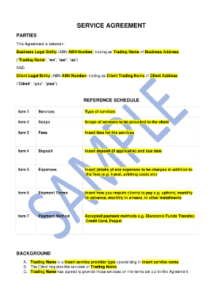Navigating the construction industry’s contractual landscape can be complex. In Australia, where the industry operates under a unique set of legal and regulatory frameworks, Australian Standard (AS) contracts provide a uniform, reliable basis for agreements between parties. Understanding these Construction Contracts is essential for anyone involved in the construction sector. Here’s your primer on integrating AS contract templates into your business operations.
-
What are Australian Standard (AS) Contracts?
Australian Standard contracts are pre-formulated templates designed to be fair and equitable for all parties involved in a construction project. They are developed by Standards Australia, an independent organisation widely recognised for establishing benchmarks across different industries. These contracts have become the industry norm due to their comprehensive nature, addressing key areas such as performance criteria, payment processes, risk allocation, and dispute resolution.

-
Why Use ‘AS’ for Construction Contracts?
- Consistency: AS contracts standardise the terms of construction agreements, promoting consistency across projects and stakeholders.
- Clarity: With clear terms and conditions, these contracts minimise the misunderstandings that can lead to disputes.
- Compliance: They ensure that contractual agreements adhere to current Australian laws and building codes, reducing legal risks.
- Flexibility: While standardised, AS contracts can be adapted to suit the specific needs of a wide range of construction projects.


-
How to Implement AS in Your Construction Contracts
- Understand Your Needs: Before selecting an AS contract template, clearly define the scope, scale, and specific requirements of your project. Different templates cater to different types of construction engagements.
- Select the Appropriate Template: Choose a contract template that aligns with your project. For instance, AS 4000 is a general conditions contract suitable for a range of construction projects, while AS 4902 is tailored for design and construction projects.
- Customise with Care: While AS contracts provide a solid foundation, they may need to be customised to address project-specific details. Engage with legal counsel to ensure any alterations maintain the integrity of the contract and comply with legal standards.
- Negotiate Fairly: Even with a standard template, terms may need to be negotiated. Approach negotiations with transparency and the aim to achieve a balanced agreement that protects all parties’ interests.
- Educate Your Team: Ensure that your team is well-versed in the contents of the AS contract. They should understand their responsibilities, obligations, and rights as stipulated in the agreement.
-
Conclusion
Australian Standard contracts serve as a guiding beacon in the construction industry, providing structure and security to the complexities of construction-related transactions. By incorporating AS contracts into your business practices, you align with industry standards, foster transparent relations, and build a framework that supports project success from the ground up.
Remember, while AS contracts are designed to be fair and comprehensive, they are not a substitute for legal advice. Always consult with a legal professional before finalising any Construction Contract to ensure it meets your project’s specific needs and legal requirements.
For more insights into expert procurement strategies and contract templates for your business, visit our resources here or get in touch via our contact page.
Be sure to follow us on Linkedin and share this article:



